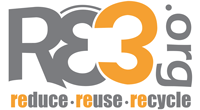Like a few previous posts, here are some good tidbits of news and information that have recently come into my e-mail inbox while out of town.
The Georgia Recycling Coalition, in conjunction with the Georgia Department of Community Affairs and several industry representatives, released an informative advisory and analysis summarizing the factors that influenced the recent drop in recycling commodity values along with a set recommendations for “weathering the storm:”
- Market prices for recycled commodities were at historic, unsustainable highs – this market correction was expected but exacerbated by the worldwide credit crisis and global recession.
- The number of recycling programs in the country has grown, thus increasing the overall supply of recovered materials.
- As the economy slows the manufacture and sale of new products has slowed thus lowering the demand for paper products and other recyclable materials.
- Asian markets may have overreacted to the financial market crisis by ceasing paper and other recyclable commodity imports.
- When the Asian markets ceased imports, a significant “new” supply of recyclable materials was available in the U.S.; however with a sluggish economy, demand for the existing supply of recyclables was already slowing.
- Demand for recyclables, although reduced in a sluggish economy, will continue; however it will be more localized to the end markets using the materials – transportation is a major factor impacting the market price of recyclable commodities. (In the long run, this may make recycling more sustainable by linking where materials are collected to the users.)
- Lower oil prices have had an impact on recycled plastic commodity prices but may ease the need for recyclable revenues needed to offset high fuel prices for recyclable collection.
Impact to local governments – what to do….
- Don’t over react! Just like the financial markets, now is not the time to sell. Need to stay in the “market” for the long-haul. Markets are cyclical – the cost to restart versus maintaining a recycling collection program during a sluggish recyclable market is significant and should be considered carefully.
- Minimize collection costs. The collection and transportation of recyclables is a major cost of recycling. Single-stream collection programs will minimize collection costs and as market values drop, single stream collection programs will continue to off-set time, labor and cost intensive manual source separated collection programs.
- Minimize processing costs. Identify stable, efficient recycling processors. Automated, efficient processing recycling centers will be key in lowering processing costs while still maintaining a degree of high quality materials for end markets.
- Some local companies may look at this as a feasible time to make upgrades to facilities in order to streamline their operations toward higher efficiency; this should be construed to be a positive move toward future operations, although it may seem inconvenient for the short term
- Hold the course:
1. Recyclables delivered to local end users support local business, jobs and economies;
2. Recycling conserves water and energy, resulting in manufacturing savings thus building stronger local economies;
3. Recycling is a strong component of any livable/sustainable community index; and
4. The cost to process recyclables is typically less expensive than disposal costs.
- Consider short-term collection contracts. If you are considering, or have a long-term contract, include or add a provision to share in commodity processing costs and/or revenues depending upon the market conditions; understanding that recyclable collection is a service many residents want or have come to expect in their community.
- Remember, commodity prices are subject to supply and demand. Market prices have been at an all time high for the past few years, when making decisions on program changes look at a three-year average (at a minimum) of market prices before conceding to renegotiate revenue sharing contracts or modifying a recycling collection program.

No comments:
Post a Comment